Dear Mom and Dad,
Sorry if I’ve been a little out of touch lately. You wouldn’t believe what these last two weeks have been like!! The recruiting for the new business is going at a brisk pace, and is quite time consuming. Out of 100 applicants there are six who are a good fit. Two will end up signing. And I’m learning more every day about what it takes to start a business over here. If this first phase of the business is successful, it will mean a reasonable income for me so I can work full-time working with Dad on his Constraint Theory book. I also spent all of last weekend catching up on grading papers, and I’ve just submitted my final exams to the school for their approval. (Funny, they had no comment on what they wanted me to teach, but they suddenly have opinions on what I should test!)
Last October, before all of this extra-curricular activity took off, I visited Beijing’s new Technology Park recruitment office, asking if they invest in startups (as so many tech parks do around the world). I figured I had nothing to lose by pitching the Data Egg idea to a country where the market was as large as Europe and where there was no patent issue to work around. Just last week I received a phone call from a medium-sized, state-owned company who invests in such startups, and they were interested in hearing more! So on Tuesday I made my usual pitch, and my sole goal of the meeting (to get another meeting with someone higher-up) was achieved!
The second meeting ended two hours ago. Frankly, with all that has been going on, I was quite relieved when they said “Not interested”. (Of course, in China “Not interested” could easily mean “We’ll take your idea and run with it, but we’re not interested in including you in the deal”. But the Data Egg is not the kind of idea that ordinary people latch onto, so I don’t think there’s much of a chance of that happening.)
The semester is starting to wind down; I have a little less than a month left, and although I’ve enjoyed the challenge immensely, I am also glad it will be over. My plans for January are to ensure that 20 teachers arrive by mid-February, travel a little to the South of China (where it’s a little warmer), come back and teach a 10-day intensive course during the winter break (which should be quite profitable if we can fill the classes – it will be a good litmus test to see if this business will actually fly), and then take off for Denmark to visit a friend. I should be home by late February.
I hope you both are doing well and are keeping warm!
Love, Gary
P.S. – Have a latke for me!!

Stairs. (I don’t remember where. They all look alike after awhile.)
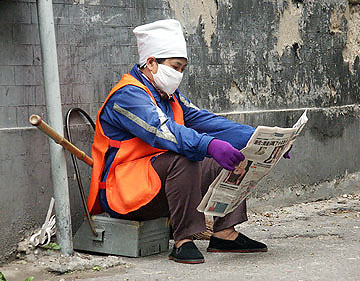
Street Cleaners still wear face masks as part of the official uniform.

Three kinds of traffic.
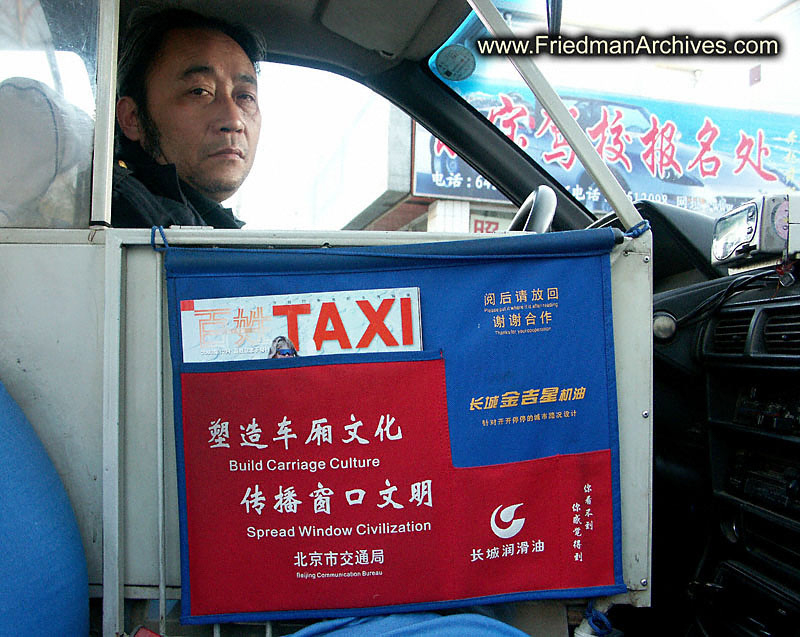
The sign on the “cage” (no bars on this one) reads “Build Carriage Culture” and “Spread Window Civilization”. I’m sure this meant something before it was translated.
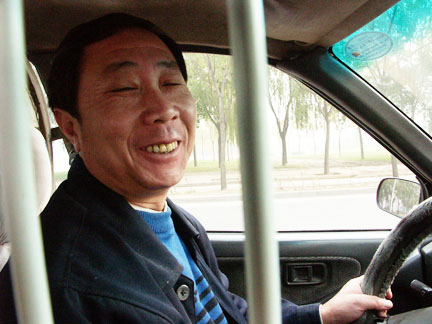
Driving in Beijing
I probably should have talked about this as soon as I arrived, because after awhile you just don’t notice it. On the one hand driving (or being driven) in Beijing can be a scary experience. On the other hand it is said to be more intense outside the city, and frankly I think India and Boston are much worse.
The one rule to remember if you wish to be a successful driver here is: Be Aggressive. Nobody here is ever going to let you in if you wish to change lanes. And if you are foolish enough to leave space in front of you, be prepared to have someone jump right in without warning. It’s your own fault. Many Westerners label the driving here as “reckless”, when in fact most of the drivers I’ve seen here are actually pretty responsible. The difference is the different tolerance for closeness. Apparently, in China there is none. Whether you’re driving next to a pedestrian or another vehicle, a few angstroms of space is all you need. And you must be doubly careful if you choose to walk across the street at an intersection!
10 years ago 90% of traffic on the road was taxis; now it’s about 30%. But the number of taxis hasn’t actually changed. A jump in prosperity means more people now own a car, and as a result Beijing is now suffering daily traffic jams as bad as Los Angeles. (An interesting side note: car sales went through the roof when SARS hit. I guess those who could afford it wanted to minimize contact with others who used public transportation.)
And another strange thing – very, very few taxi drivers know how to read a map! They know the city inside out, and once you say the name of your destination they’ll get you there in a hurry, but showing them a map and pointing them to the destination (the preferred method for a foreigner who doesn’t know the language) will usually not get you very far (both literally and figuratively). The drivers here are also incredibly honest — all of the “beware of rip-offs from the Taxi drivers” warnings in all the books I read haven’t proven true.
But the accident rate is so high that many foreign companies with offices here often prohibit their employees from driving themselves around. Not only are they worried about accidents, but also the heavy penalties for injuring someone in a crash:
-
A driver who injures another person could be liable for paying the injured person’s medical expenses.
-
A driver who disables another person could be liable for supporting the disabled person for the rest of that person’s life, no matter what the person’s age when the accident occurred.
-
A driver who kills a working adult who has dependents could be liable for financially supporting all the dependents (parents, spouse, and/or children) for the rest of their lives. (Source: “Culture Shock: Beijing at your Door” (a book) by Kay Jones and Anthony Pan)
Add to this the historic tendency for the courts to “stick it to the wealthy foreigner” when handing down judgments, and you’ll understand why corporations hire drivers for their executives here.
Other taxi tidbits:
-
Very few taxi drivers know how to use a stick shift properly.
-
Most don’t care about the condition of the vehicle since they don’t actually own it. (This helps to explain the first bullet.)
-
Drivers are usually in small cages – isolated from the passengers.
-
During SARS the Taxi’s had a record of when the vehicle had last been “sanitized”.
Mini-Photo Album – Things we can no longer do in the ‘Land of the Free’
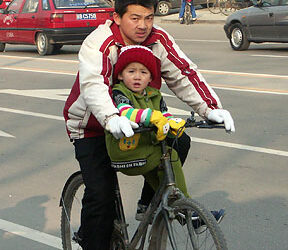

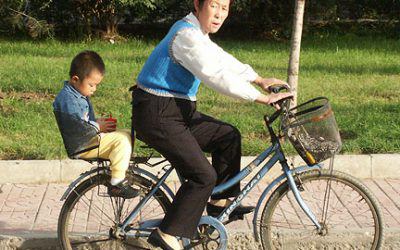

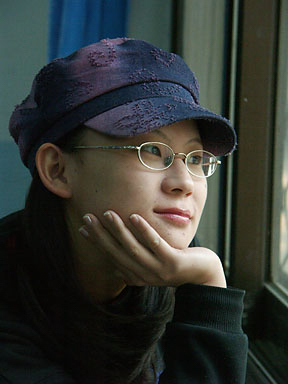
Meet the Students
Learning English
By Wang Xin (“Sunny”)
“What life were like for a typical Chinese college student? After writing the article, you might say, “Wow, you work so hard and I never have to do this when I was in college!”
In China, parents use all their savings to provide their child with high education. But as we know, china is the largest country in the world, even for the population is the first. Only a few students could have the opportunity to study in the university. Actually, the student must work very hard, because the competition is very intense. Recently, the way led to the university becomes more and more open. Not only our government offers more chances for student but also abroad study is necessary.
I had a very relax high school time. My parents are not so traditional that enforce their child to study hard and enter the university. They pay none attention to our study. My uncle and aunty take the duty. My uncle is really a good example for me. Although he didn’t have the chance to study in University, he still very successful. All of our family feel proud of him. “Do what I like” is their teaching way.
But actually for me, is really hard to find. They support every decision which I made. The first decision I made was studying in this college. The school provide an international cooperation project and students could have the opportunity to study abroad. When I first studied English with foreign teacher, I felt so excity and unhappy. Our teacher always frown upon while I was asking question.
From that moment, I began studying hard. After class, I study at least 5 hours per day. My improvement was so rapid that teacher became willing to point me. English has six parts: listening, reading, writing, speaking, vocabulary, and grammar. For listening, every day I listen the English tape for 2 hours and try to practice oral English with my classmates, especially for activity speaker. All of our textbooks are in English. Try to read all of them to improve my reading skills. For writing, daily English diary is a way to memorizing words is a hard work. But if I want to be the perfect, I must keep on. ‘Practice makes perfect’. This proverb really encourage me when I study English.
All in all, there’s a will, there’s a way.”
Rebuttal
I feel a need to rebut all this propaganda about how studious Chinese students are. We all know the reputation, and we’ve all read their stories about how much pressure there is at home to study and make something of yourself. But frankly, at my colleges anyway, I don’t see it. I do not see hives of students (Gaggles of students? Flocks of students?) studying in the dorms or libraries in the evenings. I do not hear anybody tell me “Oh, I studied all weekend” when asked how their weekend was. (The answer is usually “I played computer games”, “I went shopping”, or “We played cards”). My students seem no different from any other students in America – they work as little as possible, try to cheat as much as they think they can get away with, copy each other’s answers, and sleep in class much of the time. Maybe it’s because I’m teaching at the equivalent of a community college instead of Beijing University (or “Beijing Normal University” – oh, the jokes I could make with that name!)
Although most of my students are pretty good, one class is particularly bad – few do the homework, in-class assignments, or participate in tests (if they even show up to class at all). Many used to routinely come in exceedingly late until I started locking them out 5 minutes into the class period. I don’t really mind any of it – students have always been this way, and they always will be. It’s a game and I enjoy playing it. And while I believe I have found the right balance of challenge, interaction, fun, and good old-fashioned work for these students, the responsibility to step up to the plate is theirs; if they don’t want to participate, it is not my problem. Most of them will fail my class. Few seem too concerned.
But sometimes their ability to conspire amazes me. Like last week, for example. In the morning I gave a vocabulary test comprised of difficult words from the next reading assignment (just to prime them a little to make the reading easier). The very first definition I gave them was “Someone who has been in jail; someone who was convicted of a felony”. The correct answer from this week’s list was “felon”, but about one third of the class wrote “Abraham Lincoln”, another phrase from this week’s text.
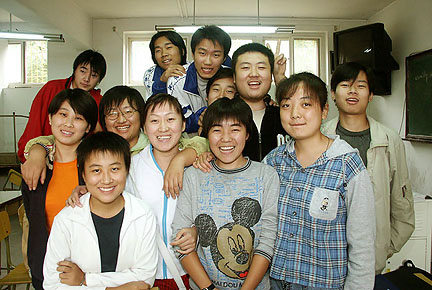

There’s only two possible explanations for this. The first thing I did was verify that the Chinese / English dictionary did not list Abraham Lincoln as a felon. (Hey, don’t we list Josef Stalin or Mr. Mao as an evil leader?) Having eliminated that possibility it stands to reason that the answer had to have been given verbally; in Mandarin, by one student and only the students within earshot would have heard it. The seating pattern supported that theory.
But that was nothing. Later I went to my next class, put my papers down (including the test papers from the previous class), went next door for a minute to print next week’s assignment, and then came back and gave the same test. This time, a whopping 98% of the class wrote “Abraham Lincoln” as the first term! Inside I was actually amused, but I had to pretend to be disappointed and annoyed because it was expected of me, and that’s the only thing they respond to.
“If your first answer is ‘Abraham Lincoln’, you get an automatic zero on your exam!” I proclaimed with calm authority after the test ended. And that day I set a record for the number of zeros issued in a 10-minute period.
Until next time…
“Yours Truly, Gary Friedman”
December 18, 2003